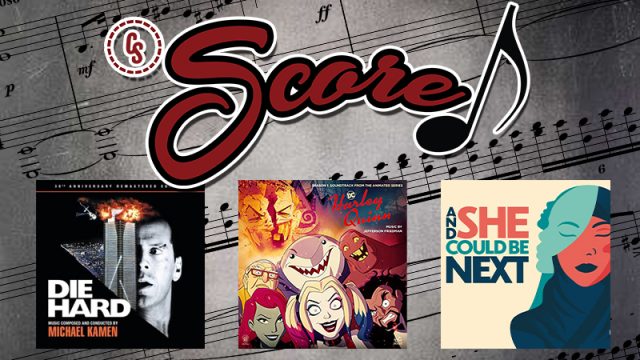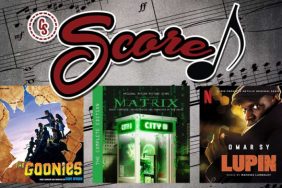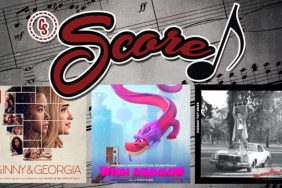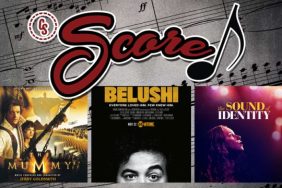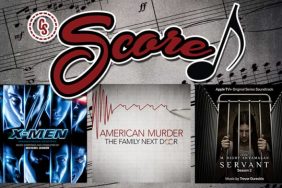CS Score: Die Hard: 30th Anniversary Edition & Harley Quinn Composer Jefferson Friedman
Yippee kay yay, soundtrack lovers! Today we’ve got an amazing batch of material for you to check out. First, a look at the soundtrack to the PBS docuseries And She Could Be Next, featuring the single “Believe” by Sa-Roc. Then, we’ll take a look at La-La Land Records’ 30th Anniversary Remastered Limited Edition of Michael Kamen’s classic Die Hard, which recently became available again. Finally, we sat down with Harley Quinn composer Jefferson Friedman who discussed the music to the popular HBO Max series and revealed his thoughts on writing a new theme for the Batman.
Listen to the Single “Believe” by Sa-Roc from the Soundtrack And She Could Be Next
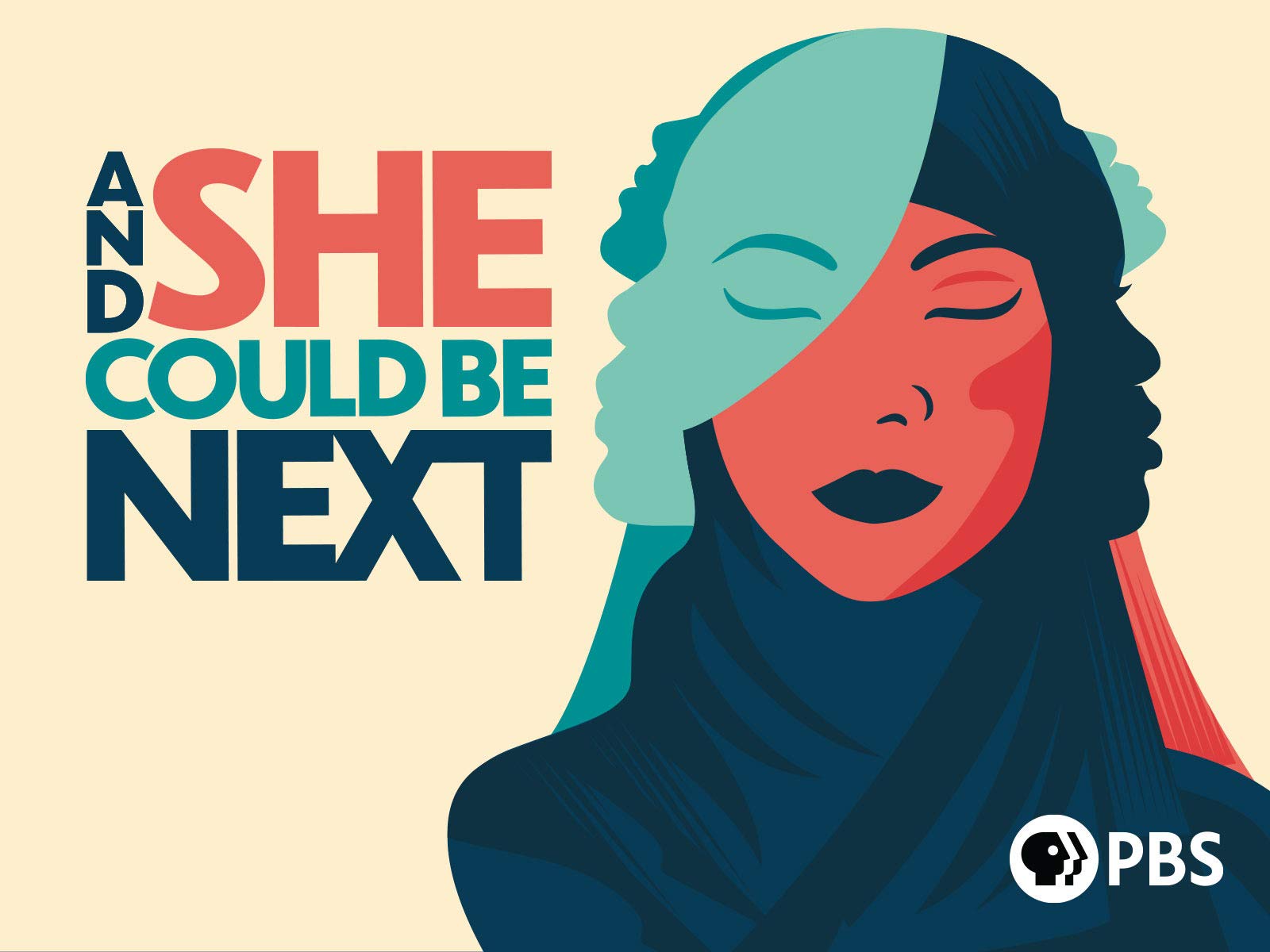
Lakeshore Records has released the first single to the soundtrack for the PBS series And She Could Be Next, titled “Believe” by Sa-Roc, Ginger Shankar and D*L*P feat. Aloe Blacc. The single is available digitally by Lakeshore Records today, September 18 and the album, “She Could Be Next” will be released October 2. and features dynamic, powerful, outspoken voices from the hip hop, pop, and R&B community including Aloe Blacc, Lila Downs, Sa-Roc, Sheila E, Arabian Prince (NWA), Madame Gandhi, Saul Williams, Tarriona “Tank” Ball, Hyro the Hero, William Stanbro, Flor de Toloache, Ruby Ibarra, Judith Hill, Shawnee, Sussan Deyhim, Sarah Thawer, Vivek Maddala, Jahi Lake, Daniel French from Las Cafeteras, Sarah DeAun McCrary, Dee MC, and Nappy Nina.
And She Could Be Next is produced by and features musician and composer Gingger Shankar (The Passion of the Christ, CNN’s We Will Rise: Michelle Obama’s Mission to Educate Girls Around the World, Akicita: The Battle of Standing Rock), who scored the two-part documentary series.
Purchase the song by clicking here!
Die Hard: 30th Anniversary Remastered Edition
Michael Kamen
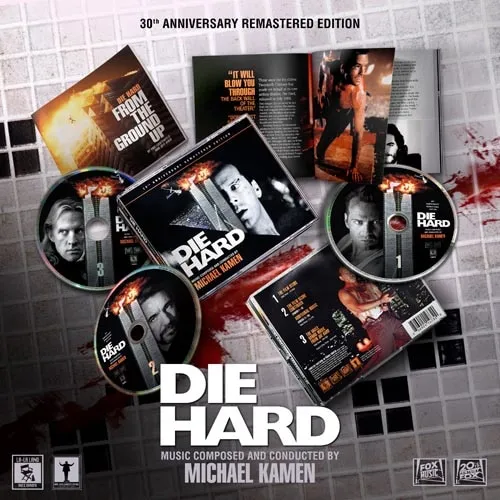
Die Hard remains on of the great (if not greatest) action films ever made — an exciting spectacle boasting terrific performances from Bruce Willis and Alan Rickman, spectacular action set pieces, and a dynamic score from Hollywood great, the late Michael Kamen.
Kamen was already well established in the industry thanks to his scores for popular films such as The Dead Zone, Brazil, Highlander, Lethal Weapon and Adventures in Babysitting, as well as his work on Pink Floyd’s “The Wall”, and was a natural fit for Die Hard. And while his score was ultimately cut and pasted all over the final film, it still serves as a massive achievement in a career that spanned several decades until the composer’s untimely death in 2003.
Using a variety of instruments, including brass, woodwinds, pizzicato and arco strings, all of which are mixed with sleigh bells as well as references to the Christmas ballad “Let It Snow!”, “Singin’ in the Rain”, and Beethoven’s 9th Symphony, or “Ode to Joy,” Kamen presents a score that is both ominous and thrilling. Indeed, the score follows the beats of John McTiernan’s film in that the first half is rather minimalistic in nature as the pic’s hero, John McClane, sneaks about the massive Nakatomi Plaza in search of a means to stop Hans Gruber and his merry band of “terrorists,” while the second half of the score is decidedly more bombastic during the more elaborate, action-heavy set pieces.
La-La Land Records originally released Die Hard: 30th Anniversary Remastered Edition back in January of 2019 but with limited quantities. As such, the soundtrack was unavailable for some time, unless you wanted to spend more than twice the amount of its initial cost on eBay or Amazon. Luckily, La-La Land saw fit to re-release the score, and the results are mighty impressive.
First off, the packaging is terrific. The entire set consists of 3 CDs and each disc boasts stunning artwork featuring a character from the film — namely, McClane, Hans and Alexander Godunov’s Karl — while linear notes written by film historian Eric Lichtenfeld offer a great encapsulation of Die Hard’s production as well as its overarching legacy along with a detailed recap of each track on the album. The score itself is presented in the manner originally crafted by Kaman and spread across the first two discs. CD2 also features additional music, including alternate cues and unused takes; and even James Horner’s Resolution & Hyperspace, which is an unused track written for Aliens but was repurposed for the moment in which Sgt. Al Powell (Reginald VelJohnson) takes down Karl at the film’s climax.
The third disc offers the score as presented (and edited) in the final film along with a drum solo titled “Wild Take” and the tracks “Roy Rogers Meets Beethoven’s Ninth,” and “Hip Hop Christmas,” with vocals by Kamen himself.
In other words: this is quite literally every single note of music written for Die Hard, edited by Bulk, remixed by Matessino, and mastered by Daniel Hersch (sourced from recently rediscovered original digital multi-track tapes) and produced in cooperation with the Michael Kamen Estate. It’s absolutely spectacular!
Tellingly, the music as originally intended by Kamen is a bit more structured in its presentation. I’m a sucker for listening to the music as heard in the film but it’s also interesting to hear how the composer approached the film versus the final result. For example, the composer originally wrote a nice bit of music for Holly and John that first appears in “Seeing Holly” and earns a reprisal in “Aftermath – Powell’s Comeback,” but that music was replaced by the aforementioned Horner cue. “The Phone Goes Dead/Party Crashers” went largely unheard in the film as well, replaced instead by music from the track “Tony and John Fight.” In all, Kamen’s music was similar to the score written by John Williams for Raiders of the Lost Ark I that it bubbles under the surface via the use of plucked strings and steel guitar (albeit with occasional bursts of action) before building to a massive finale — a structure the score as presented in the film all but eliminates. I consider Die Hard to be as close to a perfect film as one can get and wouldn’t change anything about the final release, though, as a film score enthusiast, I’d be curious to hear the music as originally intended to see how it matches up with the images on screen. And while a lot of Kamen’s music was indeed cut, including a number of darker cues that don’t quite jive with the more light-hearted nature of the pic, many of his ideas found their way into his scores for Die Hard 2: Die Harder and the equally superb Die Hard With a Vengeance.
Standout action cues include “Assault on the Tower,” “Shoot the Glass” and the thrilling “The Battle/Freeing the Hostages,” while “Message for Holly” and “I Had an Accident (Extended Version)” offer quiet, lovely string-heavy underscore.
All told, Die Hard deserves recognition as one of the finest action scores ever written and stands out as a stunning achievement in Kamen’s distinguished career. It’s a goddamned masterpiece! Click here to get it before it’s gone again!!!
Disc 1: The Film Score
Main Title :43
Seeing Holly 1:07
Terrorist Entrance 4:06
The Phone Goes Dead / Party Crashers 1:53
John’s Escape / You Want Money 6:01
The Nakatomi Plaza (Takagi’s Death) 1:45
Wiring The Roof 1:51
Approaching The Vault* :48
Fire Alarm 2:04
Tony Approaches 1:42
Tony And John Fight 1:13
Santa :57
He Won’t Be Joining Us 3:02
And If He Alters It 2:40
Going After John 4:32
Have A Few Laughs / Al Powell Approaches 3:32
Under The Table 1:59
Welcome To The Party 1:10
Yippee Ki-Yay** :45
Holly Meets Hans 1:20
Assault On The Tower 8:34
John Is Found Out 5:04
Attention Police 3:54
Bill Clay 4:09
Shoot The Glass** 2:20
I Had An Accident (Extended Version)** 2:56
Total Disc 1 Time: 70:08
Disc 2: The Film Score (Continued)
The Vault (Film Edit) 3:07
Message For Holly (Film Edit)** 3:13
Gun In Cheek (Extended Version)** 1:20
The Battle / Freeing The Hostages 6:53
The Fire Hose** 1:24
Helicopter Explosion And Showdown 4:02
Happy Trails, Hans* 1:42
Aftermath – Powell’s Comeback* 2:52
Let It Snow 1:44
Performed by Vaughn Monroe
Written by Sammy Cahn and Jule Styne
Published by WB Music Corp. OBO Cahn Music Company (ASCAP)
Chappell & Co., OBO Producers Music Publishing Co. (ASCAP)
Courtesy of Geffen Records under license from Universal Music Enterprises
Beethoven’s 9th (End Credit Excerpt) 3:53
Written by Ludwig van Beethoven; Courtesy of APM Music
Total Score Time: 100:18
Additional Music
Main Title (Alternate)* :40
The Nakatomi Plaza (Takagi’s Death) (Alternate)* 1:47
Approaching The Vault (Alternates)* 2:33
Tony Approaches (Alternate)* 1:43
Yippee Ki-Yay (Extended Version) 2:48
Assault On The Tower (Alternate Excerpts)* 3:44
Attention Police (Pick Up Opening)* 2:04
The Vault (Alternate)* 2:52
The Vault (Alternate Performance) 2:11
Message For Holly (Original Version)** 2:52
Message For Holly (Revised Version)** 2:58
Happy Trails (Tracked Film Edit) 1:13
We’ve Got Each Other 1:56
From the movie Man On Fire
Composed by John Patrick Scott (PRS)
Published by T C F Music Publishing, Inc. o/b/o New Regency Music (ASCAP)
Resolution and Hyperspace (Excerpt) 2:47
From the movie Aliens
Composed by James Horner (ASCAP); WB Music Corp; Rewind Music Inc.
Wild Percussion* 2:16
Roy Rogers Meets Beethoven’s 9th (Source) 1:33
Winter Wonderland (Source) 1:26
Written by Felix Bernard and Dick Smith
Let It Snow (Source) 1:58
Performed by Michael Kamen; Written by Sammy Cahn and Jule Styne
Published by WB Music Corp. OBO Cahn Music Company (ASCAP)
Chappell & Co., OBO Producers Music Publishing Co. (ASCAP)
Christmas In Hollis 2:58
Performed by RUN-DMC, Courtesy of Arista Records
Written by Joseph Simmons, Darryl McDaniels, Jason Mizell
Published by WB Music Corp. (ASCAP)
Ⓟ 1987 Arista Records LLC by arrangement with Sony Music Licensing
Total Additional Music: 42:19
Total Disc 2 Time: 72:38
Disc 3: The Vault: Bonus Music from Die Hard
Main Title (Film Edit) :36
Seeing Holly (Film Mix) 1:05
The Phone Goes Dead / Party Crashers (Extended Opening)** 2:22
The Nakatomi Plaza (Takagi’s Death) (Orchestra Only) 1:47
Wiring The Roof (Film Mix Excerpt) :58
Tony Approaches (Film Mix) 1:44
Going After John (Film Mix) 4:33
Al Powell Approaches (Film Mix) 2:32
Al Powell Approaches (Alternate)* 2:37
Under The Table (His Bag Is Missing) (Film Edit) 1:25
John Is Found Out (Film Mix) 5:54
Bill Clay Pt. 1 (Film Mix) 2:08
Bill Clay Pt. 2 (Extended)** 2:08
Shooting The Glass 1:08
Message For Holly (Original Version) (Orchestra Only)** 2:53
The Battle (Alternate Excerpt)** 1:19
Wild Take* 1:29
Roy Rogers Meets Beethoven’s Ninth (Alternate)* 1:36
Hip Hop Christmas (Source)* 1:44
Vocal by Michael Kamen
Total Disc 3 Time: 39:58
Total Three Disc Time: 182:44
* Previously Unreleased
** Contains Previously Unreleased Material
Interview with Harley Quinn Composer Jefferson Friedman
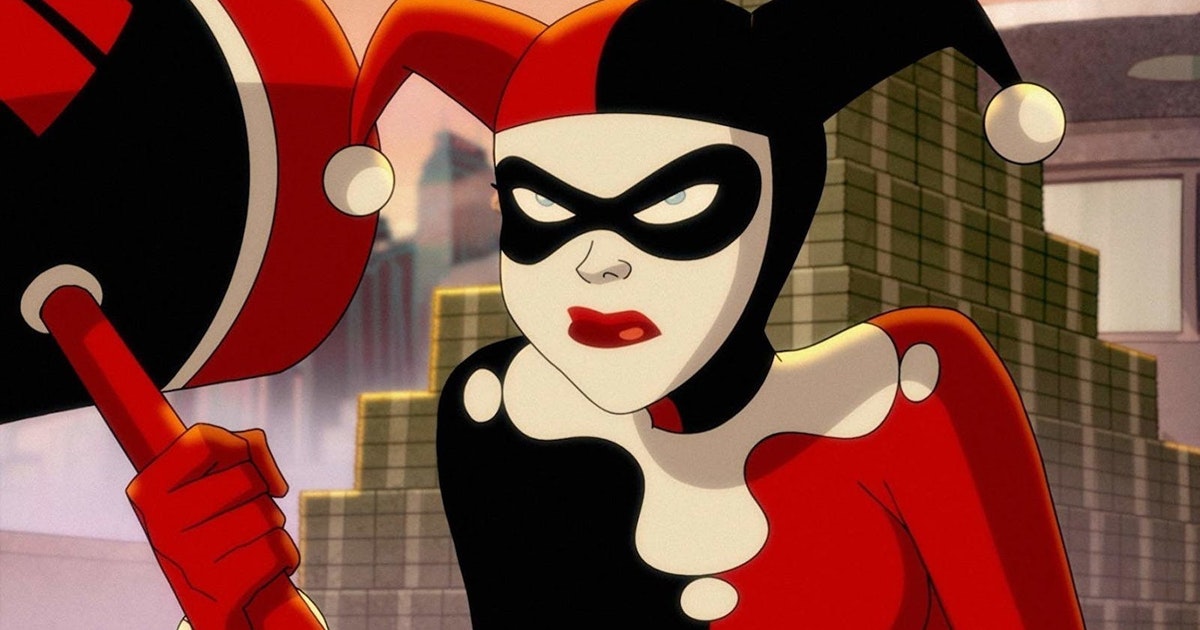
Click here to purchase Harley Quinn Season 1 soundtrack!
ComingSoon.net: How did you get involved with Harley Quinn?
Jefferson Friedman: I had worked with Pat [Schumacker] and Justin [Halpern] and Dean [Lorey] before on Powerless, and so just as we were finishing up our lists, they had mentioned to me that they just got commissioned to write a Harley Quinn pilot. And I was like, Well, I’m available. We hit it off creatively and personally, when we were working on Powerless together, and so it was a pretty natural fit for everybody, I think.
CS: When you first came aboard Harley Quinn did you know exactly how you were going to score this series?
Friedman: I think that there are two answers to that, the short answer being that like, literally in that moment, on the mixing stage for the last episode of Powerless, I had a bright vision of what the show should sound like. Then, two years passed I think between the time that they said it was being developed and the time that we started working on it. And so over the course of those two years, it’s just, you know, sort of ideas kept popping into my head and the ones that remained at the end of those two years ended up becoming the sound of the show, which ended up being like, very similar to like the flash of inspiration I had at the very beginning.
CS: Were you given a clear set of instructions on how to handle the material or were you free to do what you wanted to do?
Friedman: I mean, the process is different for every, you know, show runner/composer team. We sat down in a room, the four of us — the three guys and then Jen Coyle who is a supervising animator on the show. I presented a pitch to them of what I thought the music should sound like, and they bit. They were like, Yep, that’s great! And then and I went home and started, you know, maybe a month later, after I’d finished some of the major themes for the show, I played it for some of the guys and they were like, That’s great. That doesn’t always happen! But, you know, on this project, I think we all sort of understood from the beginning what what it’s supposed to be. And I don’t just mean the music. I mean, I think everybody worked on the show. It just had this kind of synergy with each other and just kind of knew what the show needed to be.
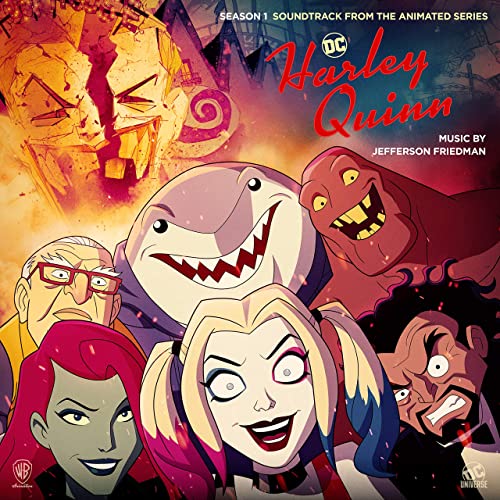 CS: How much fun was it to score a series like Harley Quinn that features all of these wild, even iconic comic book characters?
CS: How much fun was it to score a series like Harley Quinn that features all of these wild, even iconic comic book characters?
Friedman: I mean, it couldn’t have been more fun. It’s the most fun I’ve ever had doing my job. Not only was it fun, but it was really special to be able to contribute to the canon of music for these iconic heroes and doing my own particular take on it. But yeah, I mean, the variety of the score was there. Every episode had a bunch of new and different challenges and that helps keep you engaged as a composer. I had a blast.
CS: So what were some of the challenges you faced? Did feel the pressure of writing music for these famed characters?
Friedman: Yeah, for sure. I mean, the Batman theme was sort of the most intimidating. And funnily enough, the one that came out the quickest of all the major characters teams. I just remember sitting down in my studio and I just said out loud to myself, “I’m writing a Batman theme for Batman.” And it just kind of occurred to me that like, that’s kind of a crazy thing that not very many people in the history of the world have had the opportunity to do. So yeah, I definitely tried to rise to the occasion.
CS: Speaking a little more on that, we’ve had so many iterations of Batman by the likes of Danny Elfman and Hans Zimmer. How do you separate yourself from what they’ve already done? Are those scores constantly floating around in the back of your brain? Or is there an urge to mimic those styles?
Friedman: I wouldn’t say mimic those styles. I’ve said this in a few other interviews — I didn’t listen to any DC related music as soon as I started working on the project until it was over because I wanted my memory of those themes to inform the score versus like literally inform the score. So, it’s some sort of abstract idea of, like you say, like rolling around the back of my head what Danny Elfman’s theme sounds like what Zimmer’s theme sounded like etc, etc. Batman was kind of a special case, because for some of the other characters that were like fully reinvented for the show, I felt like I had the opportunity to also fully reinvent their sound. But Batman is played as such a straight guy on the show that my concept for his theme was just like, write a proper straight up the middle Batman theme. And so that theme I think sounds similar to all the other bat themes because it was by design that way.
CS: What were the what were the challenges with Season 2?
Friedman: For Season 1, and I think on the show narratively as well, you have to spend a lot of time establishing characters and establishing the world; and establishing the relationships between characters. And so, my job is to write themes that sound like those characters and then stick to the themes and only change them if I need to change them for some sort of dramatic reasons, some sort of reason to like push the story forward. Once Season 2 started, most of the main character themes were already written. So, at that point, it’s just a matter of using that material. Not coming up with it. Coming up with it obviously takes way more time than just using something that you’ve already created. So, having all the themes done for Season 1 allowed me freed me up time wise and creatively to go in bigger and deeper directions. And for that matter, I think the story of Season 2 warrants that because it’s just it’s a bigger, deeper story too.
CS: Do you view these villains in a sympathetic light? Does that change your approach to how you score them?
Friedman: For sure! I mean, how do people become super villains? You know, like what drives someone to become a super villain? It’s obviously some pain or sadness or something … to be that evil? I think it’s probably a defense mechanism for something lacking on the inside of the villain. So, I think there’s always this kind of tragic sadness to supervillains. I’m not sure I write the music in such a manner so literally or consciously. But that’s the theory or the case inside of my head. Supervillains are tragic. There’s that one episode where it flashes back inside Ivy’s brain to her childhood and shows her a little sad girl who has a birthday party of one and her father’s a monster. That requires a certain amount of pathos to the character.
CS: Do you have any news on season three?
Friedman: I have no information about season three, I’m sorry to say. That’s my way above way, way above my pay grade. As far as if we get to season three, I think at this point, some of the main themes that I established for these characters could be due for a little bit of freshening up or changing things slightly. It really all depends on on what the story is gonna be. Obviously, if it’s sort of a return to the Season 1standalone episode style, I’ll think of the season in a different way than if it’s more like the through line narrative they used on Season 2.
CS: What do you believe is the most challenging aspect of composing music for film or TV?
Friedman: I think the most challenging aspect of it is the turnaround — the quick turnaround — that everything needs to get done so quickly in this town that you always feel like you’re just barely getting everything done. We did Season 1 and Season 2 back-to-back and I got two weeks for each episode. There were 26 episodes, so it was just like a year’s worth of steady work for seven days a week. You need a lot of stamina to do it. With that said, it’s one of my favorite things about this version of my job as a composer. Because when I was a classical composer you had all the time in the world to do whatever you wanted and that can be as difficult as a short deadline. Sometimes it can be even more difficult. Deadlines are a good thing!
Harley Quinn Season 2
-
Harley Quinn Catwoman 2

-
Harley Quinn Catwoman 3

-
Harley Quinn Catwoman 4

-
Harley Quinn Catwoman

